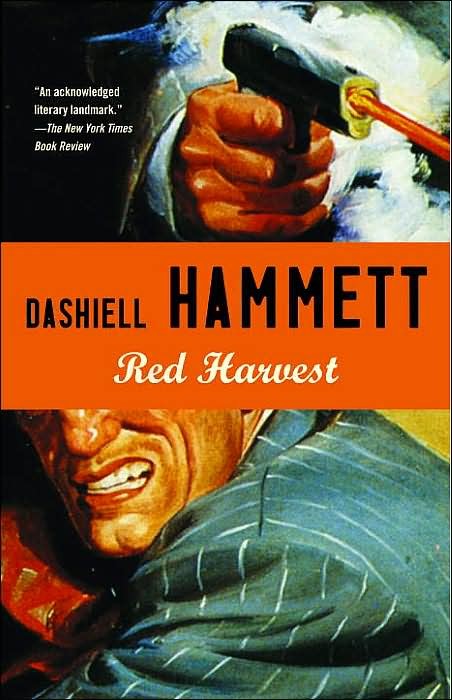All throughout September, The Loft Cinema is showing a classic film noir every Thursday night. In the spirit of this thrilling theme, and in the style of countdown shows like Adam Richman’s Best Sandwich In America, I’m taking this idea into the literary world.
Film noir and hardboiled detective stories are just one prime example of my favorite genre, the thriller, and I’m counting down to find my best thriller ever written. Each week in September I’ll eliminate one of the six contenders in a head-to-head battle with another titan of a thriller, and crown the champion from the final three at the end of the month.
Round 3: The Contenders
So far, Frederick Forsyth’s “The Day of the Jackal” beat John Le Carré’s “The Spy Who Came in from the Cold,” and Dashiell Hammett’s “The Maltese Falcon” defeated “The Dogs of War,” also by Forsyth. In this last round before the finals, Dashiell Hammett’s “Red Harvest” goes up against John Le Carré’s “Tinker, Tailor, Soldier, Spy.”
Red Harvest
An employee of a national detective agency, known only as the Continental Op, heads to the Midwestern town of Personville after being hired by the town’s newspaper editor. He is murdered before the Op gets a chance to meet him.
In investigating this new development, the Op discovers that ‘Poisonville’ (as it is grimly identified by the locals) is in the grip of competing gangs, originally invited in by Elihu Willsson, the town’s leading industrialist and the father of the dead man, to break up a labor dispute. Willsson has been grudgingly content to let the gangs run wild, but the death of his son finally pushes him over the edge. He hires the Op to clean up the town, and so begins a one man crusade to bring down the gangsters of Poisonville.
Hammett’s first novel, Red Harvest was actually a combination of several short stories. As such, there are plenty of mysteries and twists and turns, right up to the very end.
The most fascinating part of Red Harvest, however, is the depiction of power dynamics and the way the Continental Op slowly destroys them. The Op is as tough as nails and willing to kill if he has to, but his greatest weapon in his quest against the competing gangs is his brain, and his sense of motivations. He plays the three big gangsters and even the local police (also thoroughly corrupt) against each other to get them to break the tense but profitable peace and annihilate themselves.
Though there’s never been a Red Harvest movie, it is widely credited as a major inspiration for Akira Kurosawa’s classic “Yojimbo,” which in turn inspired Sergio Leone’s “A Fistful of Dollars.” A fine, fine pedigree if there ever was one.
Tinker, Tailor, Soldier, Spy
George Smiley, once a high ranking member of ‘the Circus’ (a euphemism for British intelligence), has been kicked out of his job after a disastrous mission shames Control, the Circus’ head, and those loyal to him.
He lives a quiet, desperate life, thinking of little more than this separated, cheating wife, until a few of his old colleagues contact him on the sly. A former Circus agent has secretly come forward with information he gained from a Russian spy, namely, that there is Soviet mole in the highest echelons of the Circus.
This confirms suspicions that Smiley has held for a long time, the reason why he is called upon to secretly investigate the Circus’ leaders to find the man who is betraying Britain. Tinker, Tailor, Soldier, Spy has been cited as perhaps the greatest spy novel of all time, and for good reason.
The action scenes are few and far between, but the dialogue and the interactions between the characters are more electrifying than any car chase or gun battle. Smiley may be a sad little man, but he is also an intelligence genius, the only man clever enough to spy on the spies.
The fact that the mole is connected to Karla, the codename for an incredibly dangerous Soviet intelligence operator that Smiley has a personal vendetta against, only raises the stakes in the hunt for the spy at the top of the Circus. As Smiley delves into the lives of his old comrades and friends, and therefore his own painful past, the surprising revelations keep coming right until the very last act of revenge in the saga of the Soviet spy.
There’s been a recent movie and a miniseries of this tale, but the book is recommended before and above both of them.
Round 3 Winner: Red Harvest
“Tinker, Tailor, Soldier, Spy” is an iconic work, and Smiley may be the greatest spy in literature as far as realism goes, but “Red Harvest” is almost like reading a videogame, in the best possible way. There are essentially a series of bosses, missions, and levels, all while maintaining excellent literary quality.
It’s got more action than “Tinker, Tailor” without sacrificing anything in the way of cleverness. And if you have to pick someone to live vicariously through, the Continental Op seems like he would be just a bit more fun than George Smiley.
Be sure to read next week for the final winner of the Best Thriller Ever. And if you don’t agree with these choices, feel free to comment and start a conversation.
Follow us on Twitter @wildcatarts.









